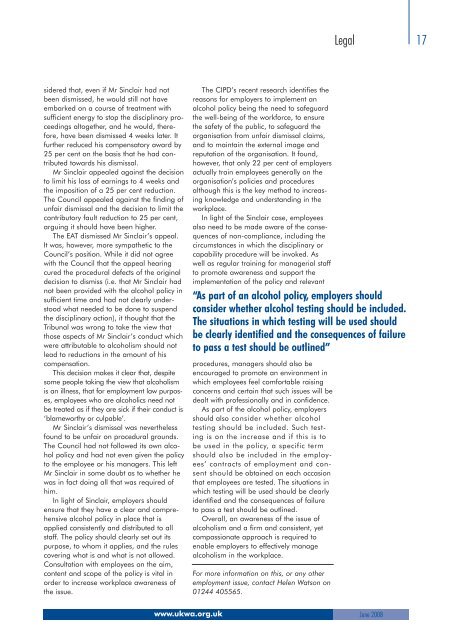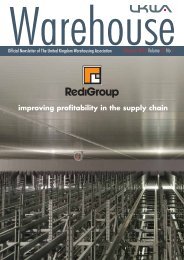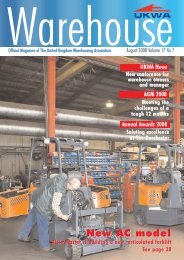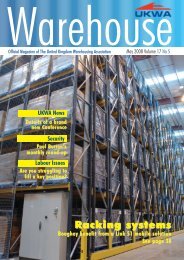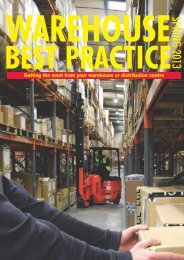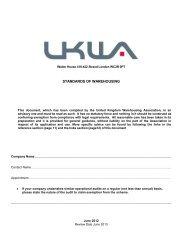UKWA FOR WEB - United Kingdom Warehousing Association
UKWA FOR WEB - United Kingdom Warehousing Association
UKWA FOR WEB - United Kingdom Warehousing Association
Create successful ePaper yourself
Turn your PDF publications into a flip-book with our unique Google optimized e-Paper software.
Legal 17<br />
sidered that, even if Mr Sinclair had not<br />
been dismissed, he would still not have<br />
embarked on a course of treatment with<br />
sufficient energy to stop the disciplinary proceedings<br />
altogether, and he would, therefore,<br />
have been dismissed 4 weeks later. It<br />
further reduced his compensatory award by<br />
25 per cent on the basis that he had contributed<br />
towards his dismissal.<br />
Mr Sinclair appealed against the decision<br />
to limit his loss of earnings to 4 weeks and<br />
the imposition of a 25 per cent reduction.<br />
The Council appealed against the finding of<br />
unfair dismissal and the decision to limit the<br />
contributory fault reduction to 25 per cent,<br />
arguing it should have been higher.<br />
The EAT dismissed Mr Sinclair’s appeal.<br />
It was, however, more sympathetic to the<br />
Council’s position. While it did not agree<br />
with the Council that the appeal hearing<br />
cured the procedural defects of the original<br />
decision to dismiss (i.e. that Mr Sinclair had<br />
not been provided with the alcohol policy in<br />
sufficient time and had not clearly understood<br />
what needed to be done to suspend<br />
the disciplinary action), it thought that the<br />
Tribunal was wrong to take the view that<br />
those aspects of Mr Sinclair’s conduct which<br />
were attributable to alcoholism should not<br />
lead to reductions in the amount of his<br />
compensation.<br />
This decision makes it clear that, despite<br />
some people taking the view that alcoholism<br />
is an illness, that for employment law purposes,<br />
employees who are alcoholics need not<br />
be treated as if they are sick if their conduct is<br />
‘blameworthy or culpable’.<br />
Mr Sinclair’s dismissal was nevertheless<br />
found to be unfair on procedural grounds.<br />
The Council had not followed its own alcohol<br />
policy and had not even given the policy<br />
to the employee or his managers. This left<br />
Mr Sinclair in some doubt as to whether he<br />
was in fact doing all that was required of<br />
him.<br />
In light of Sinclair, employers should<br />
ensure that they have a clear and comprehensive<br />
alcohol policy in place that is<br />
applied consistently and distributed to all<br />
staff. The policy should clearly set out its<br />
purpose, to whom it applies, and the rules<br />
covering what is and what is not allowed.<br />
Consultation with employees on the aim,<br />
content and scope of the policy is vital in<br />
order to increase workplace awareness of<br />
the issue.<br />
The CIPD’s recent research identifies the<br />
reasons for employers to implement an<br />
alcohol policy being the need to safeguard<br />
the well-being of the workforce, to ensure<br />
the safety of the public, to safeguard the<br />
organisation from unfair dismissal claims,<br />
and to maintain the external image and<br />
reputation of the organisation. It found,<br />
however, that only 22 per cent of employers<br />
actually train employees generally on the<br />
organisation’s policies and procedures<br />
although this is the key method to increasing<br />
knowledge and understanding in the<br />
workplace.<br />
In light of the Sinclair case, employees<br />
also need to be made aware of the consequences<br />
of non-compliance, including the<br />
circumstances in which the disciplinary or<br />
capability procedure will be invoked. As<br />
well as regular training for managerial staff<br />
to promote awareness and support the<br />
implementation of the policy and relevant<br />
“As part of an alcohol policy, employers should<br />
consider whether alcohol testing should be included.<br />
The situations in which testing will be used should<br />
be clearly identified and the consequences of failure<br />
to pass a test should be outlined”<br />
procedures, managers should also be<br />
encouraged to promote an environment in<br />
which employees feel comfortable raising<br />
concerns and certain that such issues will be<br />
dealt with professionally and in confidence.<br />
As part of the alcohol policy, employers<br />
should also consider whether alcohol<br />
testing should be included. Such testing<br />
is on the increase and if this is to<br />
be used in the policy, a specific term<br />
should also be included in the employees’<br />
contracts of employment and consent<br />
should be obtained on each occasion<br />
that employees are tested. The situations in<br />
which testing will be used should be clearly<br />
identified and the consequences of failure<br />
to pass a test should be outlined.<br />
Overall, an awareness of the issue of<br />
alcoholism and a firm and consistent, yet<br />
compassionate approach is required to<br />
enable employers to effectively manage<br />
alcoholism in the workplace.<br />
For more information on this, or any other<br />
employment issue, contact Helen Watson on<br />
01244 405565.<br />
www.ukwa.org.uk June 2008


